
Marina Ivanovna Tsvetaeva was a Russian poet. Her work is considered among some of the greatest in twentieth century Russian literature. She lived through and wrote of the Russian Revolution of 1917 and the Moscow famine that followed it. In an attempt to save her daughter Irina from starvation, she placed her in a state orphanage in 1919, where she died of hunger. Tsvetaeva left Russia in 1922 and lived with her family in increasing poverty in Paris, Berlin and Prague before returning to Moscow in 1939. Her husband Sergei Efron and their daughter Ariadna (Alya) were arrested on espionage charges in 1941; her husband was executed. Tsvetaeva committed suicide in 1941. As a lyrical poet, her passion and daring linguistic experimentation mark her as a striking chronicler of her times and the depths of the human condition.
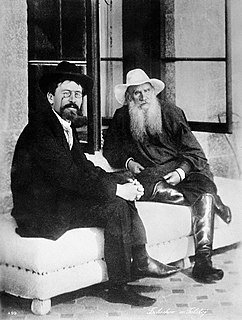
Russian literature refers to the literature of Russia and its émigrés and to Russian-language literature. The roots of Russian literature can be traced to the Middle Ages, when epics and chronicles in Old East Slavic were composed. By the Age of Enlightenment, literature had grown in importance, and from the early 1830s, Russian literature underwent an astounding golden age in poetry, prose and drama. Romanticism permitted a flowering of poetic talent: Vasily Zhukovsky and later his protégé Alexander Pushkin came to the fore. Prose was flourishing as well. Mikhail Lermontov was one of the most important poets and novelists. The first great Russian novelist was Nikolai Gogol. Then came Ivan Turgenev, who mastered both short stories and novels. Fyodor Dostoevsky and Leo Tolstoy soon became internationally renowned. Other important figures of Russian realism were Ivan Goncharov, Mikhail Saltykov-Shchedrin and Nikolai Leskov. In the second half of the century Anton Chekhov excelled in short stories and became a leading dramatist. The beginning of the 20th century ranks as the Silver Age of Russian poetry. The poets most often associated with the "Silver Age" are Konstantin Balmont, Valery Bryusov, Alexander Blok, Anna Akhmatova, Nikolay Gumilyov, Osip Mandelstam, Sergei Yesenin, Vladimir Mayakovsky, Marina Tsvetaeva and Boris Pasternak. This era produced some first-rate novelists and short-story writers, such as Aleksandr Kuprin, Nobel Prize winner Ivan Bunin, Leonid Andreyev, Fyodor Sologub, Yevgeny Zamyatin, Andrei Bely and Maxim Gorky.
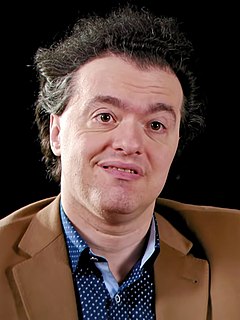
Evgeny Igorevich Kissin is a Russian concert pianist and composer. He became a British citizen in 2002 and an Israeli citizen in 2013. He first came to international fame as a child prodigy. He has a wide repertoire and is especially known for his interpretations of the works of the Romantic era, particularly those of Franz Schubert, Frédéric Chopin, Robert Schumann, Franz Liszt, Johannes Brahms, Sergei Rachmaninoff, and Ludwig van Beethoven. He is commonly viewed as a great successor of the Russian piano school because of the depth, lyricism and poetic quality of his interpretations.

Musa Cälil was a Soviet Tatar poet and resistance fighter. He is the only poet of the Soviet Union who was simultaneously awarded the Hero of the Soviet Union award for his resistance fighting, and the Lenin Prize for having written The Moabit Notebooks; both the awards were awarded to him posthumously.
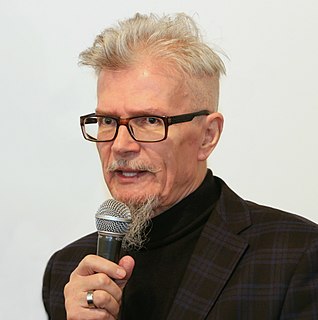
Eduard Limonov was a Russian writer, poet, publicist, political dissident and politician.
OBERIU was a short-lived avant-garde collective of Russian Futurist writers, musicians, and artists in the 1920s and 1930s. The group coalesced in the context of the "intense centralization of Soviet Culture" and the decline of the avant garde culture of Leningrad, as "leftist" groups were becoming increasingly marginalized.
The term Soviet Nonconformist Art refers to Soviet art produced in the former Soviet Union from 1953 to 1986 outside of the rubric of Socialist Realism. Other terms used to refer to this phenomenon are "underground art" or "unofficial art".

Heinrich Gustav Neuhaus was a Russian-born pianist and teacher of German and Polish extraction. Part of a musical dynasty, he grew up in a Polish-speaking household. He taught at the Moscow Conservatory from 1922 to 1964. He was made a People's Artist of the RSFSR in 1956. His piano textbook The Art of Piano Playing (1958) is regarded as one of the most authoritative and widely used approaches to the subject.

Samuil Yakovlevich Marshak was a Russian and Soviet writer of Jewish origin, translator and poet who wrote for both children and adults. He translated the sonnets and some other of the works of William Shakespeare, English poetry, and poetry from other languages. Maxim Gorky proclaimed Marshak to be "the founder of Russia's (Soviet) children's literature."

Eduard Georgyevich Bagritsky was an important Russian and Soviet poet of the Constructivist School.
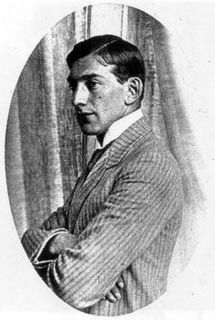
Vadim Gabrielevich Shershenevich (1893–1942) was a Russian poet. He was highly prolific, working in more than one genre, moving from Symbolism to Futurism after meeting Marinetti in Moscow. Later he pioneered the post-revolutionary avant-garde Imaginist movement, but abandoned it in favour of the theatre.
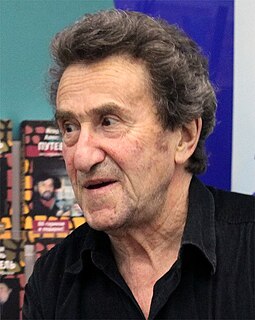
Igor Mironovich Guberman is a Russian writer and poet of Jewish ancestry; since 1988 lives in Israel. His poetry has received a great deal of acclaim primarily because of his signature aphoristic and satiric quatrains that he called "gariki" in Russian. . These short poems always feature an a-b-a-b rhyme scheme, employ various poetic meters, and cover a wide range of subjects including antisemitism, immigrant life, anti-religious sentiment, and the author's love-hate relationship with Russia.
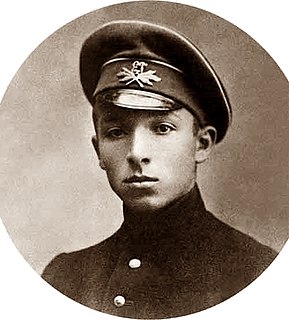
Ilya Selvinsky was a Soviet Jewish poet, dramatist, memoirist, and essayist born in Simferopol, Crimea.

Yevgeny Borisovich Rein is a Russian poet and writer, laureate of the State Prize of the Russian Federation (1997). His poetry won the Pushkin Prize of Russia, Tsarskoe Selo Art Prize (1997), or the Russian National Prize - the Poet (2012).
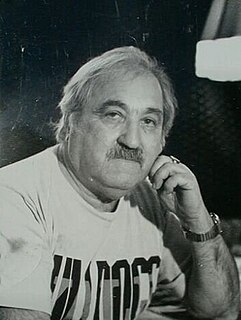
Genrikh Sapgir was a Russian poet and fiction writer of Jewish descent.

Losharik is a 1971 Soviet animated film. It was directed by Ivan Ufimtsev, with the screenplay by Gennady Tsyferov and Genrikh Sapgir.

Alexander Petrovich Mezhirov was a Soviet and Russian poet, translator and critic.

Mirra Lokhvitskaya was a Russian poet who rose to fame in the late 1890s. In her lifetime, she published five books of poetry, the first and the last of which received the prestigious Pushkin Prize. Due to the erotic sensuality of her works, Lokhvitskaya was regarded as the "Russian Sappho" by her contemporaries, which did not correspond with her conservative life style of dedicated wife and mother of five sons. Forgotten in Soviet times, in the late 20th century Lokhvitskaya's legacy was re-assessed and she came to be regarded as one of the most original and influential voices of the Silver Age of Russian Poetry and the first in the line of modern Russian women poets who paved the way for Anna Akhmatova and Marina Tsvetaeva.

David Shrayer-Petrov is a Russian American novelist, poet, memoirist, translator and medical scientist best known for his novel about refuseniks, Doctor Levitin, his poetry and fiction about Russian Jewish identity and his memoirs about the Soviet literary scene in the late 1950s-1970s.
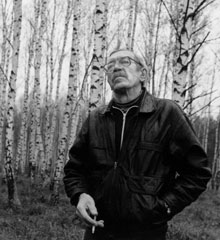
Igor Vulokh was a Russian nonconformist artist of the 1960s, a leading exponent of abstraction in Russian art.

















